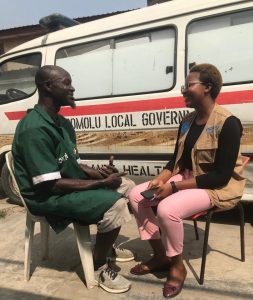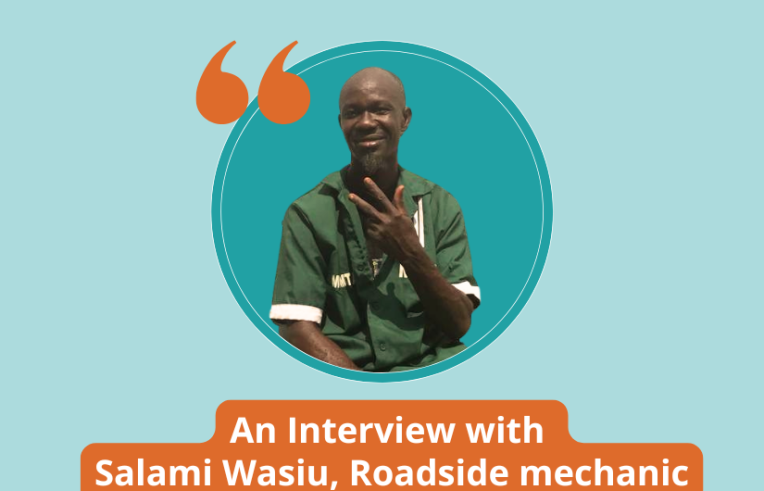It is arduous to effect changes within a large group of people. However, Salami Wasiu, the secretary of the Motor Mechs and Technicians Association of Nigeria (MOMTAN), found a way to keep his colleagues in check by promoting healthier habits after learning about the dangers of infectious diseases through our community-based surveillance project in 2024.
In his words, “They would rather buy soap of 100 Naira to wash their uniforms because it is cheaper than paying the fine of 2,000 Naira. Once I catch them looking unclean, I seize their uniforms and make sure they pay that fine”.
What are some of the new skills or things you learned?
From this project, the most important thing I have learned is the importance of neatness in preventing diseases. Before, there have been a lot of diseases around with people complaining around me but now that has reduced. Mechanics are very important and when telling them to do things they have to see the changes in those who are telling them [to do] that thing. So before work, you clean your surroundings, clean your hands, and do the same after work.
How confident do you feel now about teaching others how to prevent the spread of diseases?
The confidence I have is that I see a lot of changes in people. Before you see people wearing dirty clothes for weeks and they come around to complain of headaches and body pain but since I joined this program I started to educate my people [fellow mechanics], telling them to wash their uniforms at least two times a week. ‘If you wear your uniform on Monday and Tuesday, wash them on Wednesday night so that you can wear them on Thursday,’ and I encouraged them to tell their apprentice to wash them for them if they cannot. I was able to help them understand that their complaints of headaches, body pains and even purging come from dirtiness, and if they can change it will help improve their health.
Can you share a specific example of something you did in your community to spread the word about staying healthy after you became a Health Champion?
Before, in my association, there was nothing like putting a fine for dirtiness but since I became a Health Champion I implemented it in our laws that if you are caught that your uniform is dirty, you will pay a fine of 2,000 Naira and I seize their uniforms. So they later realised that instead of paying that amount it is better for them to buy soap of maybe 50 or 100 Naira to wash their clothes.
What changes have you noticed around you since you started sharing what you learned?
Using myself as an example, for two or three days when I worked, I used to need a day to rest because I was not feeling very strong. But since the program, I can work two weeks without feeling weak; I feel stronger. I clean my environment and take time to rest, I have not been falling sick as regularly as I used to.
What challenges have you faced while trying to use what you learned in the community and how did you handle these challenges that made reception easier?
The challenge I faced was relating to the elders among my fellow mechanics. They always find it difficult to do new things that they have not been used to and it is difficult for them to listen to me because I am trying to change them from what they have not been doing before. They like doing things the old way they have been doing it. The only way I try to manage is that since a few of them are already changing, I believe that with more time and effort maybe they will change too.
In the future, what role would you like to play in keeping your community safe and what would you like to see differently in your community when it comes to staying healthy?
Hmmmm… that will be hard, but I believe that if I am made the chairman of this association it will be easier. To implement and enforce these things is hard since I am not the chairman, but if I am the chairman they will have no choice but to obey. That is the only thing I am looking forward to.

Key group leaders play a vital role in effecting behavioral change for members within their sphere of influence. We employed the strategic approach of working with key group leaders of various associations including mechanics, religious leaders, butchers, market women, tailors, transport workers, and others through our SCKaR-IDP project. The results are far-reaching, as these leaders, working with the local health authorities, are instrumental in educating more community members about lifestyle changes to keep them safe from contracting infectious diseases. The full story of this impact can be seen in this video.




